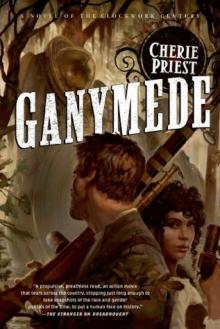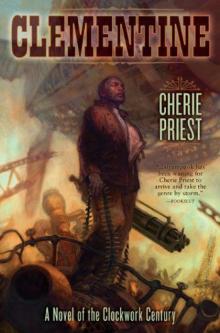- Home
- Cherie Priest
Dreadnought tcc-3 Page 4
Dreadnought tcc-3 Read online
Page 4
“Me either,” she confessed. “But I don’t know anybody in Washington.”
“Are you sure?”
“Pretty sure.” She turned the envelope over in her hand, still unwilling to open it, reading the stamped mark that declared the station in Tacoma where the message had been composed.
“You . . . you going to open it?” Paul Forks asked, then seemed to think the better of it. “Never mind, it’s no business of mine. I’ll leave you alone,” he said, and turned to go.
She stopped him by saying, “No, it’s all right.” A laundry boy bustled past her, prompting her to add, “Let me get out of the hallway, here. No sense in blocking up the main thoroughfare.” She carried the envelope to the back scullery stairs, where no one was coming or going at that particular moment.
Paul Forks followed her there, and sat down beside her with the stiff effort of a man who hadn’t yet learned how to work around his permanent injuries. He was careful to keep a respectful distance, but the naked curiosity in his face might’ve been mirrored in her own, if she hadn’t been so fiercely tired.
“Washington,” she said aloud to the paper as she extracted it from the light brown envelope and unfolded it. “What’s so important out in Washington that I need to hear about it?”
“Read it,” he encouraged her. Paul Forks couldn’t read, but he liked to watch other people do it, and he liked to hear the results. “Tell me what it says.”
“It says,” she declared, but her eyes scanned ahead, and she didn’t say anything else. Not right away.
“Go on.”
“It says,” she tried again, then stopped herself. “It’s my . . . my daddy.”
Paul frowned thoughtfully. “I thought your kin came from Waterford?”
She gave a half nod that ended in a shrug. Her eyes never peeled themselves off the paper, but she said, “I was born there, and my momma and father live there now, working a farm that’s mostly dairy.”
Paul might’ve been illiterate, but he wasn’t stupid. “Father? Not your real pa, then?”
Though she didn’t owe him any explanation, she felt like talking, so she said, “My daddy ran off when I was little. Went West, with his brother and my cousin, looking for gold in Alaska-or that was the plan as I heard it. For a while he sent letters. But when I was about seven years old, the letters just . . . stopped.”
“You think something happened to him?”
“That’s what we always figured. Except, it was strange.” Her voice ran out of steam as she read and reread the telegram.
“What was strange?” Paul prompted.
“One day Aunt Betty got a box in the post, full of Uncle Asa’s things, and Leander’s things, too. Leander was my cousin,” she clarified. “And there was some money in there-not a lot, but some. There was also a note inside from somebody they didn’t know, but it said Asa and Leander’d died on the frontier, of cholera or something. Anyway, when I was about ten, the justice of the peace said that my momma wasn’t married anymore on account of desertion, and she could marry Wilfred. He’s been my father ever since. So I don’t know . . . I don’t know what this means.”
The tone of her voice changed as she quit relating ancient history and began to read aloud from the sheet of paper, including all the stops.
“To Vinita May Swakhammer stop. Your father Jeremiah Granville Swakhammer has suffered an accident stop. His life hangs by a thread stop. He wants you to come to Tacoma in the Washington territory stop. Please send word if you can make it stop. Sheriff Wilkes can meet you at station and bring you north to Seattle where he lies gravely wounded stop.”
The letter sagged in her hands until it rested atop her knees.
“Is that all?” Paul asked.
“That’s all.” She stared at the letter, then looked up at Paul. “And all this time, I figured he was dead.”
“It looks like he ain’t.”
“That’s what it looks like, yeah,” she agreed. And she didn’t know how to feel about it.
“What’re you going to do?”
She didn’t shrug, and didn’t shake her head. “I don’t know. He left me and Momma. He left us, and he never sent for us like he said he would. We waited all that time, and he never sent.”
They sat in silence a few seconds, until Paul Forks said, “He’s sending for you now.”
“A little late.”
“Better late than never?” he tried. He leaned back and braced against the stairwell in order to help push himself back to a standing position. “Sounds like he might be dying.”
“Maybe,” she agreed. “But I’m not sure if I give a damn. He left us . . . Jesus, fifteen, sixteen years ago. That son of a bitch,” she mumbled, and then she said it louder. “That son of a bitch! All this time, he’s been out West just fine, just like he said he was going to be. And all that time, we sat at home and wondered, and worried, and finally we just gave right up!”
“He might’ve had his reasons,” Paul said, awkward as he stood there, uneven on his one real foot and one false one, and unsure exactly who he was defending.
Glaring down at the paper, she said, “Oh, I’m real sure he had his reasons. There are about a million reasons to leave a woman and a little girl behind and start a new life someplace else. I guess he just picked one.”
He said quickly, “Don’t you want to hear it?”
“Why would I want to hear it?” She wasn’t quite shouting, but she was warming inside, like a furnace catching its coals. The heat spread up from her belly to her chest, and flushed up her throat to her cheeks. “A million reasons, goddamn him, and I don’t need to hear even one of them!”
“Because you don’t care?”
“Damn right, because I don’t care!” Except that she was shouting now, and nearly on fire with anger, or sorrow, or some other consequence of her tumultuous week. “Let him die out there, if that’s where he wanted to be all this time!”
Paul Forks held out his hands, trying to halt her, or just defend himself-even though it wasn’t his fight, and he wasn’t the man with whom she was so furious. “Maybe he’s where he wants to be, or maybe he’s just where he ended up. Either way, he wants to see his little girl.”
Mercy gave him a look like she’d kill him if he blinked, but he blinked anyway. And he continued: “Someday, you’ll wish you’d gone. If you don’t do it now, like as not, you’ll never get another chance-and then you really will spend the rest of your life wondering. When you could’ve just . . . asked.”
She clenched the telegram in her fist, crumpling the paper. “It won’t be as simple as that,” she said. “If he was dying when this was sent, he’s probably dead by now.”
He fidgeted. “You don’t know that for sure.”
“It’d take weeks to make the trip. A month or more, I bet. You know as well as I do what the train lines are like these days. Everyone talks about transcontinental dirigible paths, but nobody’s making it happen. Maybe I could hop, skip, and jump it by air-but that’d take even longer than going by train. Forget it,” she said, stuffing the wad of paper into her apron pocket.
Paul Forks stepped out of the stairwell and shook his head, “Yes ma’am. I’ll forget it. And I’m sorry, it wasn’t my place to bother you. It’s only . . .”
“It’s only what?”
“It’s only . . . when I took that hit on the field, and when they brought me here . . . I sent for my wife and my boy. Neither one of them came. All I got was a message that my boy had died of consumption six months after I went to war, and my wife went a few weeks behind him.”
She said, “I . . . Paul. I’m real sorry.”
He shifted uncomfortably in his clothes. “Anyway, that’s why I stayed on here. Nothing to go home to. But I don’t mean to pry. It just hurts like all get-out when you think you’re meeting your Maker, and there’s no one there to send you off.”
With his left hand, the whole one, he touched her shoulder in a friendly way. And he left her alone there, in the stairwe
ll with the message she couldn’t stand to read again, and no idea how she was going to answer it.
Still pondering, she went back up to her bunk, and opened her cases to retrieve the stationery she’d taken from Captain Sally’s stash down in the hospital office. Not knowing what else to do, or what else to think about, she sat on the edge of the bed and started writing.
Mercy’s handwriting wasn’t any good, because she’d never been schooled long enough to make it smooth, but it was legible. And it said:
Dear Mrs. Henry,
My name is Vinita Lynch and I am a nurse at the Robertson Hospital in Richmond, Virginia. I am very sorry to tell you that your son, Gilbert Henry, died this afternoon of February 13, 1879. He was a good soldier and a nice man, and he made jokes while we tried to save him. He had been wounded bad but he died peaceful. I stayed with him until he was gone. He spoke fondly of you and his brother. His last thoughts were of home.
When she was finished, she sealed it up and set it on the nightstand beside her bed, to be mailed on Monday, when the post came.
Three
Mercy Lynch told Sally, “Thank you. For everything.”
She’d already said the rest of her good-byes, though they’d been few: to the other nurses, a couple of the doctors, and to Paul Forks, who’d worked beside her for six months and would have guessed why she was leaving, regardless.
No one had mentioned her departure to any of the patients. It was better not to, she’d decided. She’d seen other women leave before, going down the rows and receiving impassioned pleas, promises of future remembrance, and the occasional marriage proposal; and she wasn’t interested in any of it. She’d learned, by watching other employees come and go, that it was best to simply leave at the ordinary time, and fail to return.
If she made any declarations, she’d cause a scene.
If she merely went away, it would probably be days before any of the bedridden men noticed. They had their own problems and pains to distract them, and the absence of one nurse out of thirty meant little to most of them. Eventually someone would look up, scratch his head, and wonder, “What ever happened to Nurse Mercy?” and then Captain Sally would say, “She left. Last week.” At which point, the invalid would shrug.
Mercy figured it was easier to ask forgiveness than permission. They’d forgive her for leaving. But they might not give her permission to go.
Sally was different, though, and she understood. She lowered her voice, even though they were in the woman’s office and there was no one lurking nearby. “I’m glad you’ve got your widow’s papers, and the scraps of Union pension. That’ll take you most of the way, I expect. Their money’s worth more than ours.”
Mercy said, “Ma’am, if anyone sends for me here, you’ll give them the address in Waterford?”
“Of course I will. Did I forget anything? You’ve cleaned out your bunk upstairs . . . and you’ve tucked away the nursing papers, I hope? My recommendation letter will mark you as one of ours, and that’ll be good for the first legs of your trip, but there’s no telling what you’ll find out West.”
She promised, “I’m going south, then up the river and west. I have a plan.”
“You’d better. It’s a long trip, darling. I’ll worry for you, and pray.”
Mercy hugged her. Then she made one last walk through the first-floor ward, past the entry to the ballroom, out through the corridor that would take her through the kitchen, and into the backyard grounds . . . so that no one but the staff would see how she carried a suitcase and a large shoulder bag stitched with a distinctive red cross. The suitcase she was taking had come with her from Virginia; the other one had been the property of the hospital, so she was leaving it behind. But the shoulder bag was a gift from Captain Sally. In it, Mercy carried the basics of her profession, as well as her papers, her money, a few small books, letters, pencils, and other useful objects that made her feel prepared.
At the curb to the side of the Robertson house, she stood squeezing her luggage and wondering where to begin, and how. The entirety of her planning process amounted to little more than what she’d told Captain Sally.
But first things first: She went to the Western Union office.
The clerk at the counter took the envelope with her father’s message and read it, and while he perused the marks, Mercy said, “I need to send a message back. To . . . to Sheriff Wilkes, I guess. Wherever this telegram came from. I need to tell him that I’m coming.”
The small man in the striped vest peered at the paper through a pince-nez and told her, “I can certainly do that. And I’m sorry to hear about your father,” he added politely.
He quoted her a price, which she paid from the cash that Sally had offered, an immediate severance payment, plus a bonus. And with the help of the clerk, she composed a response to send back across three thousand miles.
TO SHERIFF WILKES: PLEASE TELL JEREMIAH SWAKHAMMER THAT HIS DAUGHTER WILL COME TO JOIN HIM STOP THE JOURNEY MAY TAKE SEVERAL WEEKS STOP WILL SEND ANOTHER TELEGRAM WHEN MY ARRIVAL IS NEARER STOP
She couldn’t think of anything else to add, so she watched while the clerk transcribed her message and placed it into a box on his desk. He explained that the telegraph operator was out of the office, but that when she returned, the message would be sent out across the lines.
Mercy thanked him and left, emerging on the street again with her bags in hand and an intense nervousness in her heart-a steady fear that this was the wrong thing to do, and her father would probably be dead by the time she arrived, anyway.
“But it’ll be an adventure,” she said to herself, not so much believing it as clinging to it.
Slinging her pack over one shoulder, she stepped down off the Western Union’s wooden porch and into the street, where she dodged one speeding cab and leaned backwards to avoid a lurching wagon. In the distance she could hear shouting, and warnings of incoming something-or-others headed for the hospital; she heard “Robertson” above the din, and her chest ached.
She should drop this ridiculous mission.
She should go back, where she was needed.
Even if she made it all the way West, and even if she made it to her father’s bedside, would they know each other? Her memories of him had distilled over sixteen years, down to blurs of color and a rumbling voice. When she thought of him, if she tried to push aside her anger at his leaving, she could recall glimpses of a wide-shouldered, brown-haired man with arms as thick as logs. But she remembered little of his face-only a scratchiness, from when she’d rubbed her cheek against his.
Maybe, then. Maybe she’d know him.
But would he know her? It’d been a lifetime between knee-high childhood and Robertson nurse. She’d grown several feet, to a height that was just shy of “quite tall” for a woman, and the corn-tassel blond hair of her youth had grown to a darker shade that was closer to unpolished gold than to baby yellow. The willowy limbs of her formative years had given way to a frame that was sturdy enough for farm work, or hospital work. She was not dainty, if in fact she ever had been.
She hesitated at the edge of the street, recoiling from the traffic and wondering if she shouldn’t go back to the office to send another telegram to let her mother know what she was doing. But then she came back to her senses and resolved to write a letter and post it from the road.
Always easier to ask forgiveness than permission.
On the street corner, a little boy in ill-fitting pants cried out the daily news. He hefted a stack of papers up like a Roman shield and declared the latest known troop movements, wins, losses, and points of interest. “Yankees rebuffed at Nashville!” he declared. “Maximilian the Third calls for Texian investigation into missing peace force!”
She took a deep breath, picked the appropriate direction, and got walking. The boy’s bellowing voice followed her. “Mystery surrounds northwestern dirigible disappearance in Texas! Terrible storm strikes Savannah! Rebs take heavy losses in Bowling Green!”
She shuddered and kept mo
ving, four blocks past the narrow three-storied hotels and boardinghouses and the wider, lower shapes of banks and dry goods stores. On the steps of a big white church stood a man with a big black Bible, urging people to come inside and repent, or join him for fellowship, or some other thing in which Mercy was not interested. She stuck to the edge of the crowd and ignored him, and did her best not to look at the giant steeple the color of bone.
She passed another set of churches, lined up shoulder to shoulder with one another despite their dogmatic differences, then came to a stockyard, then a large foundry populated by soot-covered men in clothes filthy with sweat and tiny burns. One of them called out to her, opening his mouth to say something dirty or childish.
But when Mercy turned his way, the man closed his mouth. “Pardon me, Nurse. Ma’am,” he said upon seeing her cloak and the cross on her satchel.
“Consider yourself pardoned, you lout,” she grumbled, and kept walking.
“I’m sorry,” he said after her.
She didn’t answer him. She adjusted her bag so the cross was more visible against her shoulder blade. It was not a foreign emblem, or a Yankee emblem, or even a Confederate one. But everyone knew what it meant, pretty much, even if once in a while it got her mistaken for one of those Salvation Army folks.
In the distance, over the tops of the mills, factories, and shipping warehouses down in the transportation district, she could spy the rounded, bobbing domes that indicated the tops of docked dirigibles.
Before long a sign came into view, announcing, RICHMOND REGIONAL AIRSHIP YARD. Beneath it, two smaller signs pointed two different directions. PASSENGER TRANSPORT was urged to veer left, while MERCHANTS AND CARGO were directed to the right.
She dutifully followed the signs, head up and shoulders square, as if she knew exactly where she was going and what she needed. Another sign pointed to ROWS A amp; B while one next to it held another area, indicating ROWS C amp; D. But finally she spotted something more immediately useful-a banner that read, PASSENGER TICKETS AND ITINERARY. This banner was strung over a wood-front shack that was shaped like a lean-to, with no glass in the windows and no barrier in the front except a cage like those used by bank tellers.

 Maplecroft
Maplecroft Chapelwood
Chapelwood Fathom
Fathom Hellbent
Hellbent Jacaranda
Jacaranda Four and Twenty Blackbirds
Four and Twenty Blackbirds Dreadnought
Dreadnought Dreadful Skin
Dreadful Skin Bloodshot
Bloodshot Tanglefoot
Tanglefoot Clementine
Clementine Ganymede
Ganymede The Inexplicables
The Inexplicables Not Flesh Nor Feathers
Not Flesh Nor Feathers Wings to the Kingdom
Wings to the Kingdom Fiddlehead
Fiddlehead Tanglefoot: A Story of the Clockwork Century
Tanglefoot: A Story of the Clockwork Century The Agony House
The Agony House Ganymede (Clockwork Century)
Ganymede (Clockwork Century) The Inexplicables (Clockwork Century)
The Inexplicables (Clockwork Century) Clementine tcc-2
Clementine tcc-2 Grants Pass
Grants Pass Dreadnought tcc-3
Dreadnought tcc-3 Ganymede tcc-4
Ganymede tcc-4